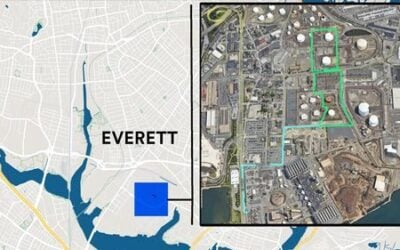Panoramic view of the system featuring the Schneider power electronics and a closeup of the power and communications wiring of the Aquion battery modules and their monitoring units. Credit: IIT
Three firms have completed an AC/DC nanogrid using solar-plus-storage technology at the Illinois Institute of Technology’s (IIT) Keating Sports Center in the US.
Solar EPC firm Azimuth Energy designed and installed the nanogrid. The system also uses Aspen batteries from Aqueous Hybrid Ion batteries manufacturer Aquion Energy, and power control electronics from Schneider Electric.
The nanogrid, which will increase energy efficiency and provide backup power, supports both alternating current (AC) and direct current (DC) loads. While the Keating center nanogrid is connected to the campus microgrid, it can also operate independently using just solar and batteries as an islanded off-grid system.
The project demonstrates the application of such systems for critical building loads such as for police stations and hospitals where power outages must be avoided.
Try Premium for just $1
- Full premium access for the first month at only $1
- Converts to an annual rate after 30 days unless cancelled
- Cancel anytime during the trial period
Premium Benefits
- Expert industry analysis and interviews
- Digital access to PV Tech Power journal
- Exclusive event discounts
Or get the full Premium subscription right away
Or continue reading this article for free
Tim Poor, chief commercial officer of Aquion Energy, said: “This is the future of distributed generation, where isolated loads powered by renewables combined with energy storage can stand alone and operate without the grid.
“Our safe and sustainable Aspen batteries are the optimal choice for long-duration storage and deep daily cycling, from nanogrids like this one at IIT to microgrids, island communities, and other nanogrids such as telecom base stations.”
Aquion’s Aspen batteries can operate at high ambient temperatures and do not degrade from partial state of charge cycling, it claimed in a release.
Schneider provided its Conext XW+ 6848 Hybrid Inverter and the Conext XW MPPT80-600 Charge Controller for the nanogrid.
Xavier Datin, vice president of solar off-grid and residential at Schneider Electric, said: “We were a proud partner in this innovative project, ready to demonstrate the benefits of the flexibility and intelligence of our Conext XW+ family of products. It supports multi-mode operation to create a perfect test-bed for validating a true hybrid system with mixed energy sources and loads on DC and AC distribution.”
Keating Sports Center at IIT where there the system is powering the 90-95 DC lighting fixtures. Credit: Aquion





